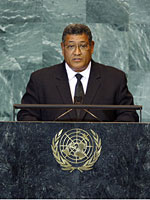Tuvalu
H.E. Mr. Apisai Ielemia, Prime Minister and Minister for Foreign Affairs and Labour
26 September 2008
- Video: English [RealPlayer -16 min]
- Statement: English [PDF]
- Back to the list of speakers
Statement Summary

© UN Photo
Click for caption and to enlarge
APISAI IELEMIA, Prime Minister and Minister for Foreign Affairs and Labour of Tuvalu, described climate change as the most serious threat to global security and the survival of mankind. It was also an issue of enormous concern to highly vulnerable small island States, such as his country. Since both the science and the economics of climate change, as well as the causes of it, were well known, human activity by all countries was urgently needed to address it.
He said it was the political and moral responsibility of the world, particularly those who caused the problem, to save small islands and countries like Tuvalu from climate change, and ensure that the people on those islands continued to live in their homes with long-term security, cultural identity and fundamental human dignity. Forcing them to leave their islands due to the inaction of those responsible for global warming was immoral. In that context, Tuvalu strongly supported the resolution on security and climate change proposed by the Pacific small island developing States to be introduced at the current session of the Assembly, and urged others to co-sponsor and properly address the issues raised in that resolution.
Continuing, he commended the Secretary-General’s establishment of a high-level Task Force on the Global Food Crisis and the formulation of a Comprehensive Framework for Action. He expressed hope that the framework would produce concrete results in countries on food security. Also, one of the most sensitive issues for small island States like Tuvalu had been the lack of recognition of their unique vulnerability in considering their graduation from least developed country status. Indeed, that vulnerability had never been seriously given recognition in the Assembly and the Economic and Social Council. To that end, he called on the United Nations to seriously work towards reform of the graduation rule, whereby no least developed country that was recognized as “highly vulnerable” would be forced to lose its status.
[Source: GA/10756]